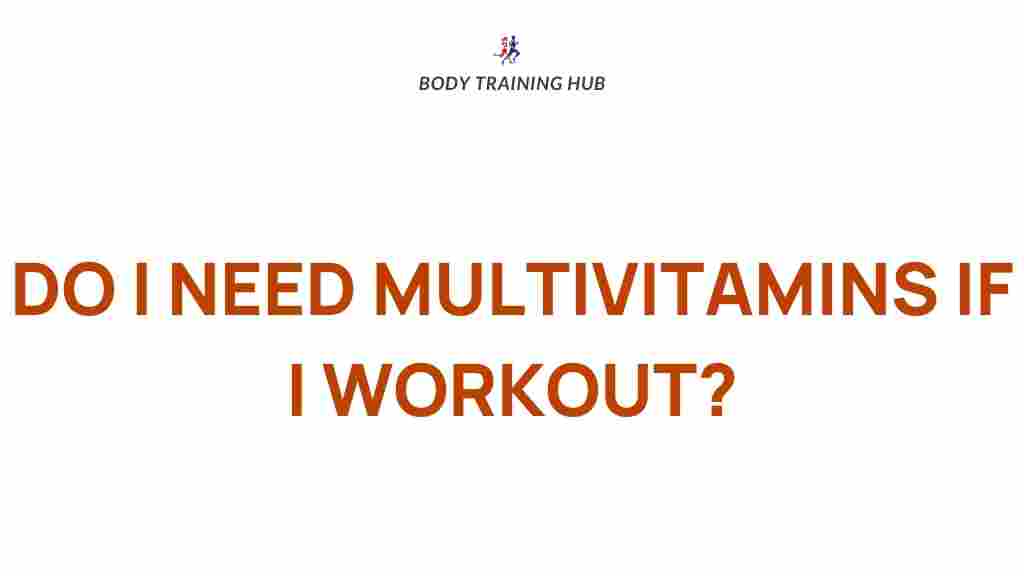Uncovering the Truth: Do You Really Need Multivitamins for Your Workout?
When it comes to enhancing your fitness routine, nutrition plays an indispensable role. While many fitness enthusiasts swear by various health supplements, multivitamins are among the most commonly debated. Do you really need multivitamins for your workout? This article aims to shed light on the necessity of multivitamins in relation to your exercise regimen, muscle recovery, and overall health.
Understanding Multivitamins and Their Role
Multivitamins are dietary supplements that contain a combination of vitamins, and may also include minerals, amino acids, and other nutrients. They are designed to fill any nutritional gaps in our diet. The body requires a range of essential vitamins to function properly, particularly during intense physical activity. But how crucial are these supplements for your workout and fitness goals?
The Importance of Nutrition for Workout Performance
Nutrition is a foundational aspect of any effective fitness routine. Proper nutrition fuels your body, enhances performance, and aids in muscle recovery. Here’s how vitamins and minerals contribute:
- Energy Production: B vitamins (like B6 and B12) are essential for energy metabolism, helping convert food into usable energy during workouts.
- Immune Function: Vitamins A, C, and E play a significant role in supporting the immune system, which can be compromised due to intense exercise.
- Bone Health: Calcium and Vitamin D are vital for maintaining bone density, reducing the risk of fractures.
- Muscle Recovery: Antioxidants found in vitamins C and E can help reduce oxidative stress and muscle soreness post-exercise.
Do You Need Multivitamins for Your Workout?
The answer isn’t straightforward and depends on various factors such as your diet, fitness goals, and overall health. Here are some considerations:
Your Dietary Intake
If you consume a balanced diet rich in fruits, vegetables, whole grains, lean proteins, and healthy fats, you may be getting all the nutrients your body needs for optimal performance. However, if your diet lacks diversity, you might benefit from multivitamins.
Specific Fitness Goals
Those engaged in high-intensity training or bodybuilding may have increased nutrient requirements. In such cases, multivitamins might be helpful in ensuring you meet your daily nutritional needs.
Age and Lifestyle
As we age, our bodies may absorb nutrients less efficiently. Additionally, certain lifestyles, such as being a vegetarian or vegan, might lead to deficiencies in specific vitamins (like B12 or iron), making multivitamins a useful addition.
Choosing the Right Multivitamins
If you decide to incorporate multivitamins into your routine, it’s essential to choose the right one. Here are some tips:
- Check the Label: Look for a product that offers 100% of the daily value for most vitamins and minerals.
- Consider Your Needs: Choose a multivitamin tailored to your age, gender, and activity level.
- Quality Matters: Opt for brands that have undergone third-party testing for quality assurance.
Integrating Multivitamins into Your Fitness Routine
To maximize the benefits of multivitamins in your fitness routine, consider the following steps:
- Consult a Professional: Before starting any supplement, it’s best to consult with a healthcare provider or a registered dietitian.
- Follow Recommended Dosages: Adhere to the recommended dosage on the label to avoid potential toxicity.
- Combine with Whole Foods: Use multivitamins as a supplement to, not a replacement for, a healthy diet.
Troubleshooting Common Concerns
Some individuals may experience concerns when taking multivitamins, such as:
Digestive Issues
Some people report gastrointestinal discomfort when taking multivitamins. To alleviate this:
- Take the multivitamin with food to minimize stomach upset.
- Choose a multivitamin that is gentle on the stomach.
Over-reliance on Supplements
It’s easy to think that taking a multivitamin can replace healthy eating. Remember:
- Supplements should complement a balanced diet.
- A diverse diet is crucial for overall health and performance.
Conclusion: Are Multivitamins Right for You?
In conclusion, whether or not you need multivitamins for your workout depends largely on your individual dietary habits, fitness goals, and health status. While multivitamins can fill nutritional gaps and support performance, they should not be a substitute for a healthy diet. Always consult with a healthcare professional before adding any health supplements to your routine. For more information on nutrition and fitness, check out this resource.
Ultimately, the key to achieving your fitness goals lies in a well-rounded approach that incorporates proper nutrition, effective exercise, and adequate recovery. If you ensure that your body receives the essential vitamins and minerals it needs, whether through diet or multivitamins, you’re on the right track to optimizing your workout performance and muscle recovery.
This article is in the category Nutrition Fundamentals and created by BodyTraining Team
